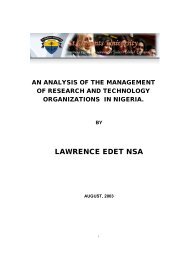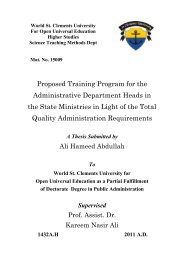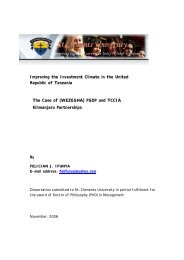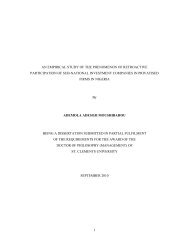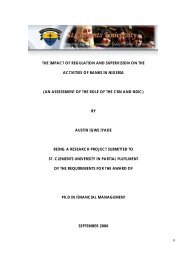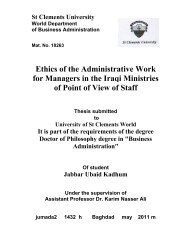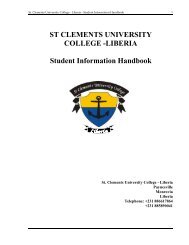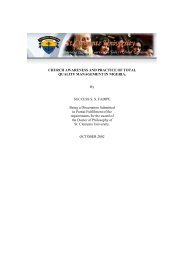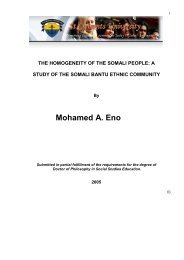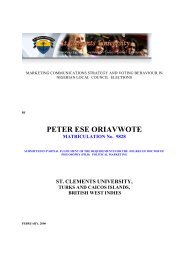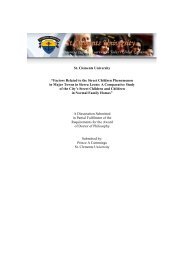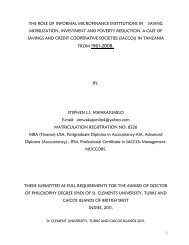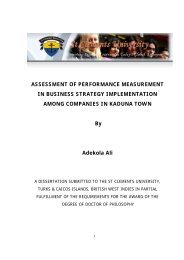Rufus Folorunso Akinyooye - St Clements University
Rufus Folorunso Akinyooye - St Clements University
Rufus Folorunso Akinyooye - St Clements University
Create successful ePaper yourself
Turn your PDF publications into a flip-book with our unique Google optimized e-Paper software.
Item 35 declares that the countries for this second option would be full members of OECD or<br />
countries which have concluded special lending arrangements with the IMF associated with<br />
the Funds General Arrangement to Borrow.<br />
OECD Countries are Australia, Austria, Belgium, Canada, Czech Republic, Denmark, Finland,<br />
France, Germany, Korea, Luxembourg, Mexico, Netherlands, New Zealand, Norway, Poland,<br />
Portugal, Slovak Republic, Greece, Hungary, Iceland, Ireland, Italy, Japan, Spain, Sweden,<br />
Switzerland, Turkey, United Kingdom and United <strong>St</strong>ates.<br />
Item 36 states that claim on contract governments within the OECD will attract a zero weight<br />
(or a low weight if the national supervisory authority elects to incorporate interest rate risk);<br />
and claims on OECD non-centrals government public-sector entities will attract a low weight.<br />
Claims on central governments within the OECD will attract a zero weight (or a low weight if<br />
the national supervisory authority elects to incorporate interest rate risk); and claims on OECD<br />
non-central government public-sector entities will attract a low weight. Claims on central<br />
governments and central banks outside the OECD will also attract a zero weight if the funding<br />
and denomination are in their national currencies. In effect servicing them would not require<br />
foreign exchange hence the transfer risk would be zero.<br />
Item 37 agrees there is no need to differentiate interbank short-term claims whether<br />
incorporated inside or outside OECD. Long-term cross-border loans with a residual maturity<br />
of up to and including one year will however attract a 20% risk weight wherever incorporated<br />
banks will be weighted at 20% while for banks incorporated outside OECD the risk weight will<br />
be 100%.<br />
. The provision seems to favour interbank claims within the OECD by imposing lower weights<br />
while claim on banks incorporated outside the group attract a 100% risk weight. In effect any<br />
OECD member bank doing cross-border lending business with banks incorporated outside the<br />
group must be ready to provide a regulatory capital of 100% for all the advances made to such<br />
banks. The purpose appears to be to discourage cross-border lending to less developed<br />
countries of this world so as to ensure the safety of OECD/G10 banks.<br />
Item 38 deals with claims on non-central government and public sector entities (PSEs). It<br />
declares that in order to preserve a degree of convergence in the weight applicable to claims on<br />
G10 public sector entities below the level of central governments (i.e. <strong>St</strong>ates, Local authorities<br />
etc.) the weight should be 0, 10, 20 or 50%. PSEs in other countries within the OECD will have<br />
a 20% standard weight attached to claims on them. The Committee subjects this arrangement<br />
to review in pursuit of further convergence towards common weights and consistent<br />
definitions in member countries and in the light of decisions that would be taken within the<br />
European Community on the specification of a common solvency ratio for credit institutions.<br />
For commercial companies, claims on them will be a uniform 100% if they are owned by the<br />
public sector to avoid competitive inequality with similar private sector commercial<br />
enterprises.<br />
Item 39 is on Collateral and guarantees and it recognizes the limitation in reducing credit risk.<br />
It further states that because of the divergent practices and experiences of member countries it<br />
has not been found possible to develop a basis for recognizing collateral generally in the<br />
weighting system. The more limited recognition was however given to loans secured against<br />
cash or against securities issued by OECD central governments and specified multilateral



